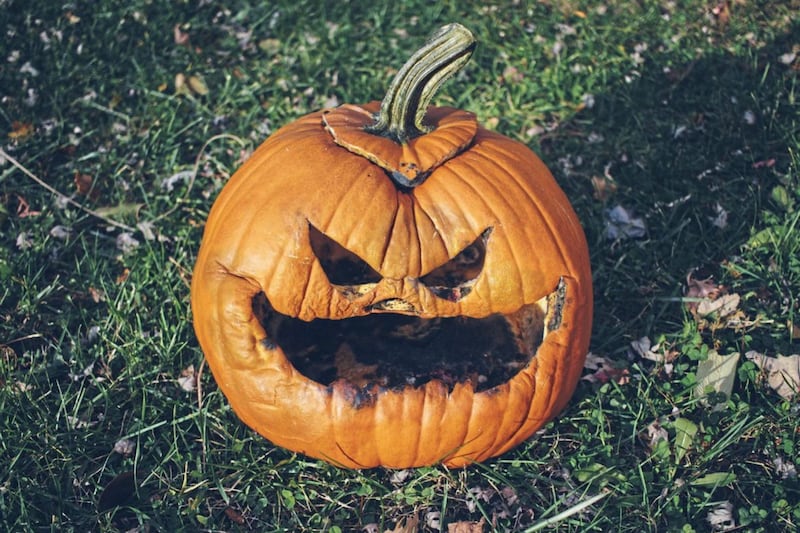HELPING to carve a scary face out of a pumpkin is a big part of the Halloween fun for kids. But most of them, and their parents, don't give a thought about how much pumpkin flesh they're wasting, and what could be done with it instead of just throwing it in the bin.
Every Halloween more than 18,000 tonnes of edible pumpkin is thrown away in the UK alone. But there are many ways of using the fruit (and yes, it is a fruit because it contains seeds, although it's nutritionally more similar to a vegetable) and not just by eating it, despite its impressive nutritional credentials.
Childcare expert Deena Billings, head of quality at Busy Bees Childcare (busybeeschildcare.co.uk), which last year ensured more than 1,000 pumpkins were put to good use after Halloween, says: "Children love Halloween and pumpkins are always part of the fun, but it's such a shame that so many go to waste each year.
"There are lots of ways to reduce how many we throw away and it doesn't just have to be cooking with them. Showing children different ways to use their pumpkins after Halloween teaches them a really valuable lesson about reducing waste and how they can do their bit to help the environment."
Here, Billings uses her imagination and creativity to suggest eight ways children can use pumpkins after Halloween:
1. Cook up a soupy Halloween treat:
Pumpkins are often seen as just a Halloween decoration, but their flesh is rich in vitamins – particularly vitamin A – and minerals that can support children's development. But make sure you buy a pumpkin suitable for cooking.
Pumpkins are versatile and can be used in lots of ways from a nutritious savoury soup to a deliciously sweet pumpkin pie.
2. Fill a sensory bag:
The fun doesn't have to stop once you've finished carving, as pumpkins offer a great sensory experience for children. Sensory play supports their language development and enhances their ability to problem solve, as well as building their fine and gross motor skills.
To make a sensory bag for children under three, scoop out the flesh of a pumpkin and place it into a gallon-sized Ziploc freezer bag. Children can feel and squish the bag with their hands and even feet.
To develop this further for over-twos, add some small world figures of spiders, frogs, cats and even laminated images of apples, cauldrons or other Halloween-themed objects. You can talk about what they can see, introducing new words to their vocabulary.
Children must be supervised throughout as these items can pose a risk if they are left unattended.
3. Bright bird feeder:
Why not give back to the environment once Halloween is over by making a pumpkin bird feeder? Simply add holes in the pumpkin for the string and place some bird feed into the bottom before hanging it in the garden. This activity isn't suitable for children under three and the pumpkin should be hung somewhere they don't have access to.
4. Pumpkin necklace:
Parents can help over-threes make a necklace out of the pumpkin's seeds. Dry them out before letting children paint the seeds in their favourite colours. Help them with the tricky part and use a needle to make holes in the centre of the seeds so they can thread them on to some string. Remember the seeds should only be used under adult supervision.
5. Learn through seeds:
Use the coloured seeds to do some learn through play activities, like practising colour recognition or counting with them.
6. Pumpkin stamps:
Budding artists can use the firm part of the pumpkin to make stamps to dip into paint and create their own masterpieces. This is great for learning about different shapes and an ideal fine motor exercise for little hands.
7. Brighten up the garden:
Leftover pumpkins make great planters for an autumnal garden feature. Just cut a drainage hole in the bottom and place plants or flowers inside before surrounding them with soil.
This is a great activity to teach children about the environment and gives them a sense of responsibility. Talk to them about the things plants need to grow well and what happens if they don't get the right nutrients.
8. Back to earth:
Instead of pumpkin planters, you could make compost out of them to keep the garden thriving. It's easy to do, will keep them out of landfill and the compost can be used to help grow next year's pumpkin.
Pumpkin soup recipe
(Serves 6)
1.2kg diced pumpkin
1 onion, diced
2 garlic cloves, crushed
400g tinned, cooked chickpeas
1 medium potato, diced
1.5lt water
Pinch black pepper
1 tbsp sweet paprika
1tsp cumin
Handful of fresh flat leaf parsley, finely chopped (leaves only)
125ml double cream
Sunflower oil
Method:
Heat oil in a heavy-based, medium saucepan on a medium heat. Add the onion, potato and pumpkin, cook until the onion is soft but not coloured. Add the spices, chickpeas and garlic and stir well before adding the water. Simmer until the pumpkin and potato are fully cooked, then take off the heat, leave for a few minutes, and blend before stirring through the cream (optional), black pepper and parsley.




